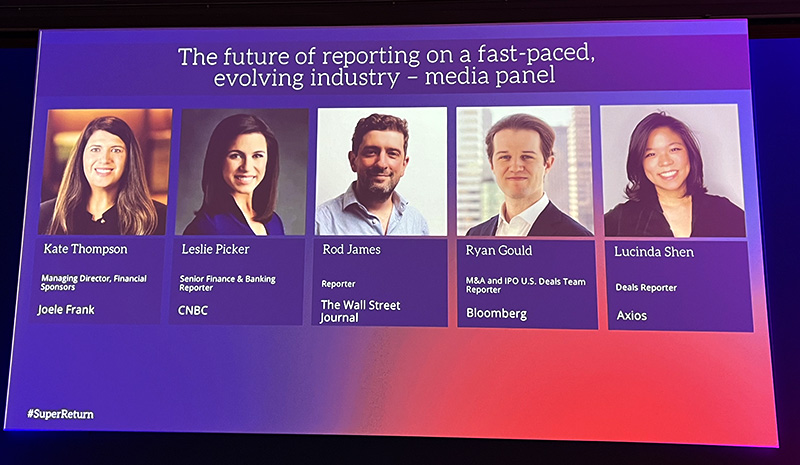As a senior PR professional focused on the private markets, I spend much of my time advising clients on media strategy and engagement. So, it’s perhaps not surprising that among the many informative panel sessions I attended at last month’s annual private markets Superbowl of events, the SuperReturn International conference in Berlin, one proved to be particularly resonant.
The session, titled “The Future of Reporting on a Fast-Paced, Evolving Industry,” featured four experienced journalists at top-tier media outlets who cover the private markets: Lucinda Shen of Axios, Ryan Gould of Bloomberg, Leslie Picker of CNBC, and Rod James of The Wall Street Journal. Kate Thompson of Joele Frank moderated the discussion.
The conversation touched on many of the challenges facing our clients: global economic uncertainty, regulatory shifts, geopolitical strain, and rapidly evolving public expectations. The reporters engage with general partners, limited partners, fund managers, consultants, and analysts, all trying to make sense of what comes next. And like our clients, they do so in an environment where what’s said can sometimes shift markets, and what’s not said can raise concerns.
Several of the reporters noted how political dynamics are having a larger impact than in years past on the behavior of market participants. Rod described how some European LPs are backing away from U.S. funds, not only because of tariffs or economic concerns, but also because of political unease. Ryan and Lucinda noted how European governments and sovereign-backed funds increasingly support homegrown tech and AI startups, in part to compete with U.S. and Chinese dominance. Private equity has always been a global asset class. It’s clear that today, national agendas influence investment flows more than ever.
AI inevitably made its way into the discussion. While the panelists acknowledged the technology’s usefulness in research, transcription, and even brainstorming interview questions, none saw it as a replacement for the relationships and judgment that define good journalism. They agreed that while AI can be a helpful tool, it can’t build trust, sense nuance, or challenge a source’s assumptions. The same holds true for PR. I certainly find AI a valuable aid, but there’s no substitute for the insight that comes from human connection and experience, especially in an industry as complex as private markets.
Media in a volatile era
The panelists spoke candidly about the daily challenges they and their colleagues face, including pressure from political voices, pervasive social media misinformation, and the persistent accusations of “fake news.” Leslie spoke directly to the erosion of trust not only in the press but in institutions of all types. Not surprisingly, all four stood in defense of traditional media and the standards to which they personally and professionally adhere. They described the rigorous processes behind their reporting, from fact-checking and editorial oversight to source vetting and legal review. It underlined the degree of diligence and care, not to mention journalistic integrity, that inform the stories shaping public perception of private markets. As a professional who works at the intersection of media and finance, I appreciate their transparency. Along with my PR colleagues, I believe that a healthy and independent press is essential to well-functioning markets.
Against this complex backdrop, the panelists emphasized the rising importance of open dialogue between private markets participants and the media. More than one remarked that unlike firms that continue to share their perspectives regardless of market conditions, those that choose not to engage or perhaps “go quiet” during volatile periods might inadvertently raise suspicion. Ryan and Lucinda both suggested that silence can be interpreted as avoidance, with reporters and other observers perhaps wondering what an organization might be trying to hide.
Anecdotally, the value of engagement appears to be resonating with some traditionally under-the-radar GPs. Ryan commented that he has heard of “a number of PE firms, both in Europe and the U.S., that are looking for professional communications advice because they know they have to get out there.”
A sustained and effective communications effort requires engaging with the media not only when announcing a deal or a fund close, but thoughtfully and consistently over time to build trust and shape reputation. At Gregory FCA, we help clients communicate in a meaningful and credible way, providing guidance in explaining their strategies, their purpose, and their impact, in terms that stakeholders and other audiences can understand. Whether the goal is to attract new investors, position a portfolio company for a strategic acquisition or sale, or build visibility among peers and other audiences, sustained media engagement is a strategic advantage.
The goal is to stay in the ongoing conversation. This holds true when the narrative is easy, but also when it’s not. In fact, it’s often in more challenging circumstances that an organization that is visible, credible, and engaged, can realize its greatest reputational gains.
I left the panel discussion with a renewed appreciation for the journalists who, as the panel demonstrated, approach the private markets with integrity, unbiased and genuine interest, and professionalism. They are important players in a fast-moving ecosystem, and I was reminded, once again, of the power of communications done right, not just to inform and influence, but to help build trust and clarity in an increasingly complex world.
